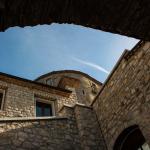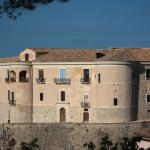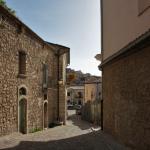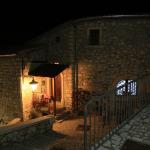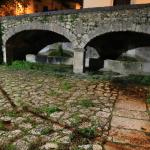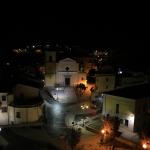The Municipality of Gesualdo is located in the area of the Calore Valley. It's a town with 3,446 inhabitants, located 676 metres above sea level, at 35 km from Avellino. The territory extends for 27.34 sq km and the adjoining municipalities are: Fontanarosa, Frigento, Grottaminarda, Paternopoli and Villamaina. It's crossed by the river Fredane.
The etymology of the name is linked to the prestigious Gesualdo family. The inhabitants are called Gesualdini and Saint Nicholas is their patron.
PLACES OF INTEREST
- Gesualdo Castle - Command seat of the great feudal estates of the powerful Gesualdo family and home of Prince Carlo Gesualdo (1566-1613), one of the fathers of modern polyphonic music
- Pisapia and Mattioli Palaces - Historic buildings set like jewels in the ancient village
- Church of San Nicola (Saint Nicholas) - Church dedicated to the Bishop of Mira, probably built around the 12th century
- Church of the Santissimo Rosario (Holy Rosary) - Located on the same floor as the majestic Castle, it was built in the 16th century
- Church and Convent of Santa Maria delle Grazie (Holy Mary of Graces) - Convent complex built by the will of Prince Carlo Gesualdo in 1592
- Church of Santa Maria degli Afflitti (Our Lady Comforter of the Afflicted) - Built by the will of Prince Carlo Gesualdo, it dates back to the mid-17th century
- Historic Centre of Gesualdo - Medieval settlement that revolves around the Castle and the characteristic stone alleys
- Cappellone - Imposing structure built in the 17th century, called "Cupolone" by the inhabitants of the town
- Fountains - Fountain of the Putti, Fountain of Alabastro, Fountain of the Canal, Ancient wash house
- Pine forest - It is located in the centre, in the Fiera area, and is full of paths and stopping points with equipped picnic areas
- Other churches - Church of Addolorata or of S. Rocco (Our Lady of Sorrows or Saint Roch) , Church of S. Maria delle Pietà (Our Lady of Mercy), Church of S. Antonio (Saint Anthony), Church of SS. Nicola di Bari and Antonino Martire (Saint Nicholas of Bari and Saint Anthony the Martyr)
- Other - Forgione Palace, Casa Aldorasi
EVENTS
- Flight of the Angel - Very popular religious event held every year on the last Sunday of August
- Living Nativity Scene - Fascinating representation of religiosity, tradition and history that has continued since 1991
- Passion and Death of Christ - Theatrical itinerary that, from the Cappellone, seat of the Praetorium of Pilate, goes up towards Golgotha, represented by the imposing Lombard castle
- Saperi & Sapori - Village fair of art, music, exhibitions, conferences, food and wine and workshops, aimed at enhancing the beautiful historic centre of Gesualdo
- Gesualdo Folk Event - Review of popular music from Central and Southern Italy. The absolute protagonist of the event is music with sought-after guests, local and international artists, all accompanied by a pleasant tasting of beer and gastronomic products of the Irpinian tradition
TYPICAL FOOD AND PRODUCTS
- Pomodorino seccagno di Gesualdo PAT - Tomato with a square round shape, it has an intense red colour
- Celery of Gesualdo PAT - Celery with an intense green colour due to the exposure of plants to sunlight during the development stages, and with particular organoleptic and nutritional properties
- Irpinia Colline dell'Ufita PDO - Extra virgin olive oil deriving largely from the Ravece variety, characterized by a pleasant bitter and spicy taste
- Ufita garlic PAT - Product with an aromatic flavour characterized by a high quantity of essential oils and active ingredients
FUN FACTS
Given the abundance of vegetable production, celery in particular, and city fairs, very popular even from outside, the Gesualdini were defined with the sympathetic title of "menestrari" (green grocers).
The sublime madrigalist composer Carlo Gesualdo, prince of Venosa and nephew to San Carlo Borromeo, lived in the Gesualdo Castle (1566-1613). It also hosted the poet Torquato Tasso (1544-1595).
HISTORICAL NOTES
According to some findings made in the current territory of Gesualdo the first settlements date back to a period prior to the birth of Christ. The current urban centre, however, began to rise in the Lombard period, with the construction of the first houses gathered around the Castle.
The history of the Irpinian town is closely linked to that of the family of the same name: in particular, by the will of Prince Carlo Gesualdo, the Castle was transformed from a fortress to a "musical cenacle", in which many poets and writers were guests. When the prince died, from 1622 Niccolo I Ludovisi succeeded. He married Isabella Gesualdo and contributed to continuing the season of great architectural and cultural splendour experienced by the Irpinian town at that time.
The last lords of Gesualdo, before the abolition of feudalism in 1806, were the Caracciolo and the Caccese.
Gesualdo turns out to be the keystone of the relationship with the traveller due to its extreme peculiarity and authenticity. A relationship destined to last in the heart and spirit of those who will know how to establish it
Gesualdo
Via Municipio, 83040 Gesualdo AV, Italia
Did you like it? Leave a review
Your opinion is important! It will be visible after approval by the editorial staff.
To post a comment you must be an authenticated user. Log in with Social Login
